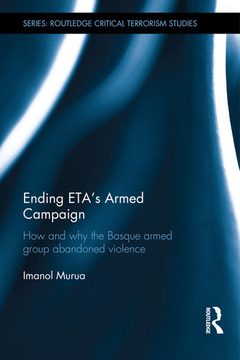Ending ETA's Armed Campaign How and Why the Basque Armed Group Abandoned Violence Routledge Critical Terrorism Studies Series
Auteur : Murua Imanol

This book explains how and why the Basque separatist armed group ETA decided to end its armed campaign against the Spanish state.
The ETA?s armed campaign for Basque independence lasted fifty years and led to more than 800 casualties. This book analyzes the factors that led to ETA ending its campaign of violence in 2011, despite having yet to achieve its political objectives. It explains how the Basque pro-independence movement?s political leadership won an internal battle and brought ETA to a position in which abandoning violence was the only feasible choice. The work argues that the key factor leading to the cessation of violence was the loss of support for armed struggle within the pro-independence social base, and it examines why and how that support decreased so decisively. Written by a former journalist, the narrative is based on more than 30 interviews, including former members of ETA, Spanish judges, former ministers of the Spanish government, political leaders of all Basque political parties?from the Nationalist Left to the Partido Popular (PP)?and international mediators. As such, it is the first book to recount in detail the inside story of the internal struggle within the Nationalist Left movement, and particularly between the political party Batasuna and ETA.
This book will be of much interest to students of political violence, ethnic conflict, nationalism, Spanish politics, security studies, and IR.
Preface
Introduction
Part I: Historical Background1. The Making of Basque Nationalism
2. ETA: From Insurrection to Negotiation (1959-1989)
3. Guns and Dialogue (1989-2007)
Part II: Facts
4. The Aftermath of a Failed Process
5. The Internal Debate
6. Pressure over ETA
7. A Year of Contacts
8. Crunch Time
Part II: Analysis
9. The Patterns
10. The Factors
11. The Management
Conclusions
Epilogue
Imanol Murua is Professor of Journalism at the University of the Basque Country, and a former political correspondent. He has a PhD in Basque Studies from the University of Nevada, Reno, USA, and is the author of several books in Spanish and Basque.
Date de parution : 11-2016
15.6x23.4 cm
Thèmes d’Ending ETA's Armed Campaign :
Mots-clés :
Nationalist Left; Active Eta; ETA; Eta’s Violence; terrorism; Eta Member; Basque country; Spanish Government; Spain; Eta’s Leadership; Basque Nationalist; Eta’s Ceasefire; Eta Prisoner; ELA; Definitive Cessation; Center Henri Dunant; Mayor Oreja; Basque Territories; Basque Group; Eta Attack; Basque Society; Armed Struggle; Ajuria Enea; Political Military Strategy; Euskal Herria; Northern Basque Country; Basque Autonomous Community; Basque Parliament



